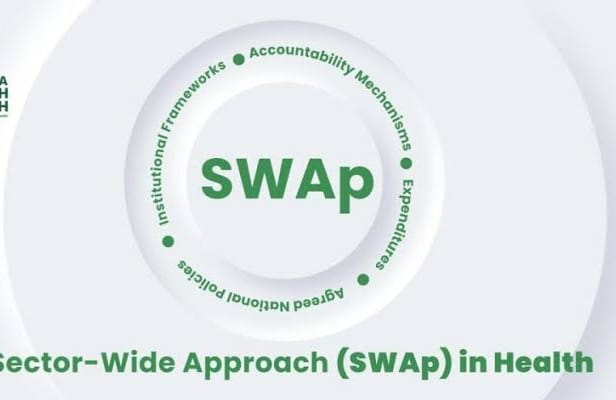By Muhammad Amaan
The Sector Wide Approach (SWAp) has highlighted the transformative achievements recorded under President Bola Ahmed Tinubu’s Renewed Hope Agenda.
Swap emphasised the pivotal role of the N1.17 trillion, 2024 health budget, the highest in Nigeria’s history, in achieving these results.
National Coordinator of SWAp, Dr Muntaqa Umar Sadiq said this in an interview with newsmen on Sunday in Abuja.
He said that the administration’s commitment to healthcare was evident through the National Health Sector Renewal Investment Initiative (NHSRII) and a signed Compact with all 36 states and the Federal Capital Territory (FCT).
Dr Umar Sadiq said that these initiatives aimed to create an equitable, resilient, and accessible health system for all Nigerians.
“At the core of these reforms is the revitalisation of over 2,100 primary healthcare centres (PHCs), with another 3,000 on track to be operational by the end of 2025.
“These upgrades mean that no Nigerian will need to travel more than five kilometres to access essential healthcare. For women who will no longer have to walk 10 kilometres to reach a clinic while pregnant, these changes are life-saving,” he said.
He said that this progress had been backed by a N46 billion Direct Financing Facility, disbursed through the revamped Basic Health Care Provision Fund (BHCPF) to over 8,000 facilities.
According to him, the Maternal Mortality Reduction Innovation Initiative (MAMII) is tackling Nigeria’s maternal and new-born health crisis in 172 high-burden local government areas.
“Tools like Joint Annual Reviews (JARs) and real-time dashboards have driven accountability and efficiency in the use of resources.
“Poor and vulnerable women now have access to free caesarean sections under the expanded National Health Insurance Authority (NHIA) package, while the National Emergency Medical Service and Ambulance System (NEMSAS) ensures emergency transport.
“Amina, a young mother from Bauchi State, is among thousands of women whose lives have been saved through these interventions,” he said.
Dr Sadiq He said that Nigeria was also intensifying its fight against infectious diseases such as malaria, tuberculosis, and HIV/AIDS.
“Over one million doses of the R21 malaria vaccine have been rolled out in high-burden states like Kebbi and Bayelsa, supported by partnerships with GAVI and The Global Fund.
“Nigeria has also strengthened its health security infrastructure. Emergency Operations Centres (EOCs) have been established in all geopolitical zones, and enhanced genomic surveillance systems now allow faster detection of diseases like diphtheria and monkeypox,” he said.
He said that the Nigeria Climate Change and Health Vulnerability Assessment Report had positioned the country as a leader in integrating climate resilience into its health systems.
According to him, over 53,000 frontline health workers have been retrained, with a target of 120,000 within three years.
He said that the Presidential Initiative for Unlocking the Healthcare Value Chain (PVAC) had catalysed one billion dollars in investments and finalised 74 business cases to boost local production of pharmaceuticals and medical devices.
Dr Sadiq also highlighted Tinubu’s appointment as the African Union Champion for Health Workforce Development, reflecting Nigeria’s leadership in addressing workforce challenges across the continent.
“The First Lady of Nigeria has also been appointed as the National and Global Champion for Tuberculosis, amplifying Nigeria’s voice in tackling this global health challenge,” he said.
Speaking of challenges and the road ahead, Umar-Sadiq said that despite these achievements, challenges like geographic disparities in healthcare access, high out-of-pocket health expenditures, and the rising burden of non-communicable diseases persisted.
He, however, expressed optimism, citing public confidence in the health system, which has grown from 37 per cent in 2023 to 54 per cent in 2024.
“These reforms are anchored in the leadership and vision of Mr President, that no Nigerian woman will lose her life-giving birth, no child will suffer for lack of care.
“The vision is also to ensure that no family will face financial ruin from illness,” he said.
With bold reforms, increased investments, and strong leadership, he said that the country was on track to build a health system that guarantees that no one is left behind, delivering hope and opportunity for generations to come.




